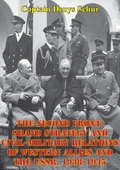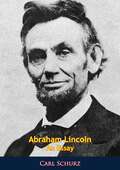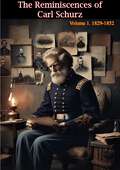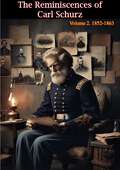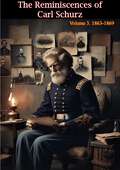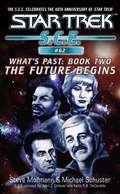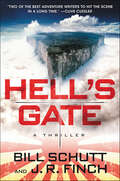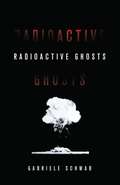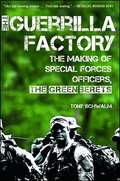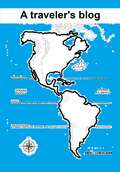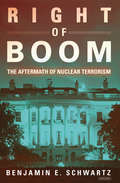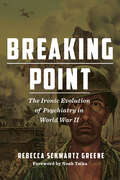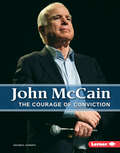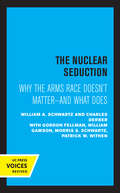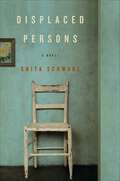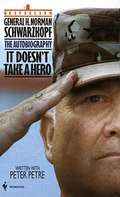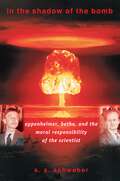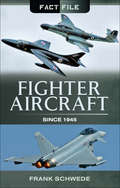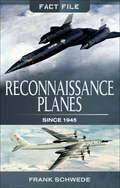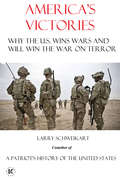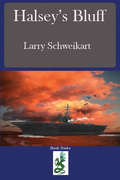- Table View
- List View
The Second Front: Grand Strategy And Civil-Military Relations Of Western Allies And The USSR, 1938-1945
by Captain Denys SchurThe debate about grand strategy in the Second World War has scarcely ended even in the 21st Century. The present study examines the classical issue of the grand strategy in Europe and the anti-Hitler coalition as concerns the US-UK-Soviet exchange about the Second Front. The great phenomenon of the Second World War was the creation of an unprecedented military alliance between the western powers and the Soviet Union. Due to mutual antagonism, inter-Allied cooperation during the Second World War was very complicated and at times extremely tense. Perhaps the most acute disagreement in the relationship between the Allies was the "Second Front" controversy. Despite desperate Soviet demands to open the Second Front as soon as possible, the Western Allies launched a massive cross-channel operation in the northwestern Europe only in June 1944. This thesis analyses the reasons why it took the western powers so long to organize and execute such an operation and its implications for the post-war order. The detailed analysis of the grand strategy during the Second World War is one of the ways to comprehend the violent 20th Century amid the carnage of the 21st Century and its own problems of grand strategy.
The Education of a Navy: The Development of British Naval Strategic Thought 1867-1914
by D. M. Schurman(From the Book jacket) When iron and steam took the place of wood in 1859-60, the Royal Navy so immersed itself in the design of its new ships that the question of how the fleet should be used was almost overlooked. The strategy inherited from the past was considered irrelevant to modern needs. Fortunately, there were some naval men who insisted that the worth of a fleet is not measured solely by the quality of its individual units. Convinced that history had a more useful purpose than the mere recounting of heroic deeds, they showed that the technicians' wholesale dismissal of wooden-wall experience had been far too hasty. The Education of a Navy tells the story of six naval historians who, although not academics by training, took it upon themselves to extract from the archives evidence that the naval past could offer guiding principles for the present. Mr. Schurman ably summarizes the careers and writings of the Colomb brothers-Captain John who was concerned with the Navy's role in national policy, and Admiral Philip whose work made the study of naval history academically respectable; the American Admiral Alfred Thayer Mahan-author of the great Influence of Sea-Power upon History, 1660-1783-who helped make the Royal Navy an instrument of foreign policy; Sir John Laughton, founder of the Navy Records Society; Admiral Sir Herbert Richmond, a formidably able officer who, after retirement, made naval history more acceptable at Cambridge University; and Sir Julian Corbett, a writer with a completely non-military background and the author of the classic Some Principles of Maritime Strategy. About the author: DONALD MACKENZIE SCHURMAN received his doctorate from Cambridge University and is now associate professor of history at the Royal Military College, Kingston, Ontario.
Imperial Defence, 1868-1887 (Cass Series: Naval Policy and History #Vol. 12)
by Donald MacKenzie SchurmanThe technical transformation of the Royal Navy during the Victorian era posed many design, tactical and operational problems for administrators from the 1830s onwards. The switch from sail to steam required the creation of a system of defended coaling stations and a greater infrastructure.
Abraham Lincoln An Essay: An Essay
by Carl SchurzAbraham Lincoln “An Essay" from Carl Schurz. Confidante of Lincoln, U.S. Ambassador to Spain, a major-general in the Civil War, a U.S. Senator from Missouri, Secretary of the Interior in the Hayes administration, author of a biography of Henry Clay, president of the National Civil Service Reform League, and an editorial writer for Harper's Weekly (1829-1906) – Print ed.
The Reminiscences of Carl Schurz: Volume 1. 1829-1852 (The Reminiscences of Carl Schurz #1)
by Carl SchurzFascinating and detailed memoirs of Carl Schurz whose political and military career spanned seminal events in Germany and the American Civil War.Carl Schurz (March 2, 1829 – May 14, 1906) was a German revolutionary and an American statesman, journalist, and reformer.... After serving as a Union general in the American Civil War, he helped found the short-lived Liberal Republican Party and became a prominent advocate of civil service reform....Born in the Kingdom of Prussia's Rhine Province, Schurz fought for democratic reforms in the German revolutions of 1848–1849 as a member of the academic fraternity association Deutsche Burschenschaft...Like many other "Forty-Eighters", he then migrated to the United States, settling in Watertown, Wisconsin, in 1852. After being admitted to the Wisconsin bar, he established a legal practice in Milwaukee, Wisconsin. He also became a strong advocate for the anti-slavery movement and joined the newly organized Republican Party, unsuccessfully running for Lieutenant Governor of Wisconsin. After briefly representing the United States as Minister (ambassador) to Spain, Schurz served as a general in the American Civil War, fighting in the Battle of Gettysburg and other major battles.After the war, Schurz established a newspaper in St. Louis, Missouri, and won election to the U.S. Senate, becoming the first German-born American elected to that body. Breaking with Republican President Ulysses S. Grant, Schurz helped establish the Liberal Republican Party. The party advocated civil service reform, sound money, low tariffs, low taxes, an end to railroad grants, and opposed Grant's efforts to protect African-American civil rights in the Southern United States during Reconstruction. Schurz chaired the 1872 Liberal Republican convention, which nominated a ticket that unsuccessfully challenged President Grant in the 1872 presidential election.
The Reminiscences of Carl Schurz: Volume 2. 1852-1863 (The Reminiscences of Carl Schurz #2)
by Carl SchurzFascinating and detailed memoirs of Carl Schurz whose political and military career spanned seminal events in Germany and the American Civil War.Carl Schurz (March 2, 1829 – May 14, 1906) was a German revolutionary and an American statesman, journalist, and reformer.... After serving as a Union general in the American Civil War, he helped found the short-lived Liberal Republican Party and became a prominent advocate of civil service reform....Born in the Kingdom of Prussia's Rhine Province, Schurz fought for democratic reforms in the German revolutions of 1848–1849 as a member of the academic fraternity association Deutsche Burschenschaft...Like many other "Forty-Eighters", he then migrated to the United States, settling in Watertown, Wisconsin, in 1852. After being admitted to the Wisconsin bar, he established a legal practice in Milwaukee, Wisconsin. He also became a strong advocate for the anti-slavery movement and joined the newly organized Republican Party, unsuccessfully running for Lieutenant Governor of Wisconsin. After briefly representing the United States as Minister (ambassador) to Spain, Schurz served as a general in the American Civil War, fighting in the Battle of Gettysburg and other major battles.After the war, Schurz established a newspaper in St. Louis, Missouri, and won election to the U.S. Senate, becoming the first German-born American elected to that body. Breaking with Republican President Ulysses S. Grant, Schurz helped establish the Liberal Republican Party. The party advocated civil service reform, sound money, low tariffs, low taxes, an end to railroad grants, and opposed Grant's efforts to protect African-American civil rights in the Southern United States during Reconstruction. Schurz chaired the 1872 Liberal Republican convention, which nominated a ticket that unsuccessfully challenged President Grant in the 1872 presidential election.
The Reminiscences of Carl Schurz: Volume 3. 1863-1869 (The Reminiscences of Carl Schurz #3)
by Carl SchurzFascinating and detailed memoirs of Carl Schurz whose political and military career spanned seminal events in Germany and the American Civil War.Carl Schurz (March 2, 1829 – May 14, 1906) was a German revolutionary and an American statesman, journalist, and reformer.... After serving as a Union general in the American Civil War, he helped found the short-lived Liberal Republican Party and became a prominent advocate of civil service reform....Born in the Kingdom of Prussia's Rhine Province, Schurz fought for democratic reforms in the German revolutions of 1848–1849 as a member of the academic fraternity association Deutsche Burschenschaft...Like many other "Forty-Eighters", he then migrated to the United States, settling in Watertown, Wisconsin, in 1852. After being admitted to the Wisconsin bar, he established a legal practice in Milwaukee, Wisconsin. He also became a strong advocate for the anti-slavery movement and joined the newly organized Republican Party, unsuccessfully running for Lieutenant Governor of Wisconsin. After briefly representing the United States as Minister (ambassador) to Spain, Schurz served as a general in the American Civil War, fighting in the Battle of Gettysburg and other major battles.After the war, Schurz established a newspaper in St. Louis, Missouri, and won election to the U.S. Senate, becoming the first German-born American elected to that body. Breaking with Republican President Ulysses S. Grant, Schurz helped establish the Liberal Republican Party. The party advocated civil service reform, sound money, low tariffs, low taxes, an end to railroad grants, and opposed Grant's efforts to protect African-American civil rights in the Southern United States during Reconstruction. Schurz chaired the 1872 Liberal Republican convention, which nominated a ticket that unsuccessfully challenged President Grant in the 1872 presidential election.
What's Past: Book 2: The Future Begins (Star Trek #62)
by Michael Schuster Steve MollmannWHAT'S PAST A special six-part S.C.E. event that flashes back to previous adventures of the S.C.E. crew from the 23rd century to the height of the Dominion War, with special guests from all across the Star Trek universe! 2375: After being rescued from the U.S.S. Jenolen by the crew of the Starship Enterprise™, Captain Montgomery Scott found himself seventy-five years removed from the time he knows, a twenty-third-century engineer now living in the twenty-fourth. Now he serves as the liaison between the Starfleet Corps of Engineers and the admiralty, supervising the S.C.E.'s mission assignments. But Scott's transition into a new century is not an easy one. The horrors of the Dominion War in particular bring about a crisis of conscience that leads Scotty from the strife-torn world of Kropasar to the pleasure planet of Risa, where encounters with Admirals Alynna Nechayev and William Ross, Ensign Robin Lefler, and Lefler's mysterious mother lead Scotty to a momentous decision....
Hell's Gate: A Thriller
by Bill Schutt J. FinchWhen a Japanese submarine is discovered abandoned deep in the Brazilian wilderness, a smart, adventurous, and tough zoologist must derail a catastrophic plot in Hell’s Gate.1944. As war rages in Europe and the Pacific, Army Intel makes a shocking discovery: a 300-foot Japanese sub marooned and empty, deep in the Brazilian interior. A team of Army Rangers sent to investigate has already gone missing. Now, the military sends Captain R. J. MacCready, a quick-witted, brilliant scientific jack-of-all-trades to learn why the Japanese are there—and what they’re planning.Parachuting deep into the heart of Central Brazil, one of the most remote regions on the planet, Mac is unexpectedly reunited with his hometown friend and fellow scientist Bob Thorne. A botanist presumed dead for years, Thorne lives peacefully with Yanni, an indigenous woman who possesses mysterious and invaluable skills. Their wisdom and expertise are nothing short of lifesaving for Mac as he sets out on a trail into the unknown.Mac makes the arduous trek into an ancient, fog-shrouded valley hidden beneath a 2000-foot plateau, where he learns of a diabolical Axis plot to destroy the United States and its allies. But the enemy isn’t the only danger in this treacherous jungle paradise. Silently creeping from the forest, an even darker force is on the prowl, attacking at night and targeting both man and beast. Mac has to uncover the source of this emerging biological crisis and foil the enemy’s plans . . . but will he be in time to save humanity from itself?
Radioactive Ghosts (Posthumanities #61)
by Gabriele SchwabA pioneering examination of nuclear trauma, the continuing and new nuclear peril, and the subjectivities they generate Amid resurgent calls for widespread nuclear energy and &“limited nuclear war,&” the populations that must live with the consequences of these decisions are increasingly insecure. The nuclear peril combined with the looming threat of climate change means that we are seeing the formation of a new kind of subjectivity: humans who are in a position of perpetual ontological insecurity. In Radioactive Ghosts, Gabriele Schwab articulates a vision of these &“nuclear subjectivities&” that we all live with. Focusing on the legacies of the Manhattan Project, Hiroshima, and nuclear energy politics, Radioactive Ghosts takes us on a tour of the little-seen sides of our nuclear world. Examining devastating uranium mining on Native lands, nuclear sacrifice zones, the catastrophic accidents at Chernobyl and Fukushima, and the formation of a new transspecies ethics, Schwab shows how individuals threatened with extinction are creating new adaptations, defenses, and communal spaces. Ranging from personal accounts of experiences with radiation to in-depth readings of literature, film, art, and scholarly works, Schwab gives us a complex, idiosyncratic, and personal analysis of one of the most overlooked issues of our time.
The Russian Air Force in the Eyes of German Commanders
by Generalleutnant Walter SchwabedissenThe Russian Air Force in the Eyes of German Commanders by Generalleutnant a. D. Walter Schwabedissen, is one of a series of historical studies written by, or based on information supplied by, former key officers of the GAF for the United States Air Force Historical Division.The overall purpose of the series is twofold: 1) To provide the U.S. Air Force with a comprehensive and, insofar as possible, authoritative history of a major air force which suffered defeat in World War II, a history prepared by many of the principal and responsible leaders of that air force; 2) to provide a firsthand account of that air force’s unique combat in a major war, especially its fight against the forces of the Soviet Union. This series of studies therefore covers in large part virtually all phases of the Luftwaffe’s operations and organization, from its camouflaged origin in the Reichswehr, during the period of secret German rearmament following World War I, through its participation in the Spanish Civil War and its massive operations and final defeat in World War II, with particular attention to the air war on the Eastern Front.In World War II the Russian Air Force came of age. The men most vitally concerned with this, aside from the Russians themselves, were commanders in the German armed forces. The experience of these commanders, then, constitutes a unique source for information on an organization whose capabilities, both past and future, are of vital concern to the world.The chief German experience with the Russian Air Force derives from World War II. It was during this period that the Russians learned most from the Germans and the Germans learned most about the Russians.This study exploits this broad German experience. Compiled from the official records of the German Air Force and from reports written by German commanders who saw action in the Russian campaign, it documents many of the Russian Air Force’s achievements as well as its failures.
The Guerrilla Factory
by Tony SchwalmTHE NAVY HAS THE SEALS, and the Army has the Green Berets. They are masters of asymmetrical warfare, trained to immerse themselves in hostile territory, sleeping near their enemies and building relationships with people who may want to kill them. Retired lieutenant colonel Tony Schwalm knows this group well, because he is one of them and he trained them. In The Guerrilla Factory, he provides an unbelievably gripping inside look into the grueling training that every Army officer must endure to become one of America's elite Green Berets. The Special Forces Qualification Course, also known as the Q Course, is infamous in U.S. Army lore. It transforms conventional soldiers, through blood, sweat, and tears, into unconventional guerrillas. As a young soldier, Schwalm earned his own Green Beret there. Later, he was the commander of Special Forces officer training at Fort Bragg, evaluating and redesigning the crucible in which leaders face brutal tests of physical strength, stamina, and wits. The Guerrilla Factory is the engaging and compelling story of Schwalm's experience there as a student (from selection to graduation) and his time as the commander of training at Fort Bragg. It is a story of young soldiers striving to become the elite of the elite--of their trials, physical and emotional, and of their triumphs and losses. In this dramatic account of the challenges faced by these young soldiers, Schwalm describes how men are forced to demonstrate ingenuity under intensely adverse conditions as they are pushed to the point of hallucination, walk until their feet are bloody, and fight off packs of angry dogs with nothing but a rubber rifle. Soldiers today face an entirely different kind of warfare and must be schooled to deal with unusual circumstances. They must have intricate knowledge of how to gather information in a dangerous, unstable atmosphere, and they need to be able to adapt quickly to differences in their surroundings. Schwalm's book takes readers deep into this world, showing exactly how soldiers acquire the necessary skills. Revealing details never before shared outside military circles, Schwalm provides a rare and rousing look inside the courageous hearts and souls of soldiers who put their lives on the line for duty, honor, and our country.
A traveler's blog: A world to travel
by Andrés SchwarcbonnThe author takes us through a wonderful journey throught different parts of the world, describing beautiful landscapes and telling funny and also dufficult anecdotes about his journey. It is a story full of wonders and self.discovery. "This is my story, a story that I would like to share, full of anecdotes and lessons lived in a life whose day to day can turn from a warm and contagious smile, to a crying to but not being able, or even an anger of those who want to trow everything away and not want to fight anymore. But something I learned is that one must get up after every fall, you must understand that beyond how difficult it can be, living, is something wonderful. Read quietly, get into the story, try to understand me, to be me. Let each word reamin as if it were the first. And while you read, I promise to accompany you throughout the story"
Right of Boom: The Aftermath of Nuclear Terrorism
by Benjamin E. Schwartz“[A] seasoned national security professional and gifted writer” offers an in-depth analysis of what might happen after a nuclear attack on US soil (Matthew Kroenig, author of Exporting the Bomb). In the parlance of disaster preparedness, “right of boom” refers to the terrifying moments after a crisis hits. In Right of Boom, national security specialist Benjamin Schwartz examines what could happen after a nuclear explosion takes place in the United States—the event that many experts have acknowledged as the greatest single national security threat we face. While many assume such an attack would automatically trigger a globally devastating exchange of nuclear attacks, Schwartz demonstrates that the realities are far more nuanced and complex. Hypothesizing an explosion in downtown Washington, DC, Schwartz maps out the likely ramifications while going deep into history to explore the limited range of options available to a commander in chief. Drawing from his experience as an analyst at the Departments of Defense, State, and Energy, Schwartz offers a fully panoramic view of a terrifyingly real possibility. “Should be required reading.” —The Washington Free Beacon
Breaking Point: The Ironic Evolution of Psychiatry in World War II (World War II: The Global, Human, and Ethical Dimension)
by Rebecca Schwartz GreeneThis book informs the public for the first time about the impact of American psychiatry on soldiers during World War II.Breaking Point is the first in-depth history of American psychiatry in World War II. Drawn from unpublished primary documents, oral histories, and the author’s personal interviews and correspondence over years with key psychiatric and military policymakers, it begins with Franklin Roosevelt’s endorsement of a universal Selective Service psychiatric examination followed by Army and Navy pre- and post-induction examinations. Ultimately, 2.5 million men and women were rejected or discharged from military service on neuropsychiatric grounds. Never before or since has the United States engaged in such a program.In designing Selective Service Medical Circular No. 1, psychiatrist Harry Stack Sullivan assumed psychiatrists could predict who might break down or falter in military service or even in civilian life thereafter. While many American and European psychiatrists questioned this belief, and huge numbers of American psychiatric casualties soon raised questions about screening’s validity, psychiatric and military leaders persisted in 1942 and 1943 in endorsing ever tougher screening and little else. Soon, families complained of fathers and teens being drafted instead of being identified as psychiatric 4Fs, and Blacks and Native Americans, among others, complained of bias. A frustrated General George S. Patton famously slapped two “malingering” neuropsychiatric patients in Sicily (a sentiment shared by Marshall and Eisenhower, though they favored a tamer style). Yet psychiatric rejections, evacuations, and discharges mounted.While psychiatrist Roy Grinker and a few others treated soldiers close to the front in Tunisia in early 1943, this was the exception. But as demand for manpower soared and psychiatrists finally went to the field and saw that combat itself, not “predisposition,” precipitated breakdown, leading military psychiatrists switched their emphasis from screening to prevention and treatment. But this switch was too little too late and slowed by a year-long series of Inspector General investigations even while numbers of psychiatric casualties soared. Ironically, despite and even partly because of psychiatrists’ wartime performance, plus the emotional toll of war, postwar America soon witnessed a dramatic growth in numbers, popularity, and influence of the profession, culminating in the National Mental Health Act (1946). But veterans with “PTSD,” not recognized until 1980, were largely neglected.
John McCain: The Courage of Conviction (Gateway Biographies Ser.)
by Heather E SchwartzThis timely title examines the remarkable life and death of John McCain, from his time as a decorated war veteran to elder statesman. Accessible text and plentiful photos cover McCain's early life, his military career, his political legacy, and his 2017 diagnosis of brain cancer. Up-to-the-minute details round out this latest look at a uniquely American figure.
The Nuclear Seduction: Why the Arms Race Doesn't Matter--And What Does
by William A. Schwartz Charles DerberThis title is part of UC Press's Voices Revived program, which commemorates University of California Press’s mission to seek out and cultivate the brightest minds and give them voice, reach, and impact. Drawing on a backlist dating to 1893, Voices Revived makes high-quality, peer-reviewed scholarship accessible once again using print-on-demand technology. This title was originally published in 1990.
Displaced Persons: A Novel
by Ghita Schwarz“This is an amazing novel. The writing is piercing and clear, and the humanity of the author and her characters will inhabit my thoughts for years to come.”—Anne Roiphe, National Book Award-winning author of FruitfulAn astonishing tale of grief and anger, memory and survival, Displaced Persons marks the arrival of a supremely gifted new literary talent, Ghita Schwarz. Schwarz’s powerful story of a group of Holocaust survivors—“displaced persons”—struggling to remake their lives and cope with the stigma of their pasts in the wake of the monumental Nazi horror is beautiful, tragic, moving, and unforgettable, chronicling the lives of ordinary people who have suffered under extraordinary circumstances.
It Doesn't Take a Hero
by Norman SchwarzkopfHe set his star by a simple motto: duty, honor, country. Only rarely does history grant a single individual the ability, personal charisma, moral force, and intelligence to command the respect, admiration, and affection of an entire nation. But such a man is General H. Norman Schwarzkopf, commander of the Allied Forces in the Gulf War. Now, in this refreshingly candid and typically outspoken autobiography, General Schwarzkopf reviews his remarkable life and career: the events, the adventures, and the emotions that molded the character and shaped the beliefs of this uniquely distinguished American leader.Note: The photo insert is not included in this edition.
In the Shadow of the Bomb: Oppenheimer, Bethe, and the Moral Responsibility of the Scientist (Princeton Series in Physics #39)
by S. S. SchweberHow two charismatic, exceptionally talented physicists came to terms with the nuclear weapons they helped to createIn 1945, the United States dropped the bomb, and physicists were forced to contemplate disquieting questions about their roles and responsibilities. When the Cold War followed, they were confronted with political demands for their loyalty and McCarthyism's threats to academic freedom. By examining how J. Robert Oppenheimer and Hans A. Bethe—two men with similar backgrounds but divergent aspirations and characters—struggled with these moral dilemmas, one of our foremost historians of physics tells the story of modern physics, the development of atomic weapons, and the Cold War.Oppenheimer and Bethe led parallel lives. Both received liberal educations that emphasized moral as well as intellectual growth. Both were outstanding theoreticians who worked on the atom bomb at Los Alamos. Both advised the government on nuclear issues, and both resisted the development of the hydrogen bomb. Both were, in their youth, sympathetic to liberal causes, and both were later called to defend the United States against Soviet communism and colleagues against anti-Communist crusaders. Finally, both prized scientific community as a salve to the apparent failure of Enlightenment values.Yet their responses to the use of the atom bomb, the testing of the hydrogen bomb, and the treachery of domestic politics differed markedly. Bethe, who drew confidence from scientific achievement and integration into the physics community, preserved a deep integrity. By accepting a modest role, he continued to influence policy and contributed to the nuclear test ban treaty of 1963. In contrast, Oppenheimer first embodied a new scientific persona—the scientist who creates knowledge and technology affecting all humanity and boldly addresses their impact—and then could not carry its burden. His desire to retain insider status, combined with his isolation from creative work and collegial scientific community, led him to compromise principles and, ironically, to lose prestige and fall victim to other insiders.S. S. Schweber draws on his vast knowledge of science and its history—in addition to his unique access to the personalities involved—to tell a tale of two men that will enthrall readers interested in science, history, and the lives and minds of great thinkers.
Fighter Aircraft Since, 1945 (Fact File)
by Frank SchwedeThe world's first jet engines were already available shortly before the end of the Second World War, but they had not been developed to a high enough standard to take part. This changed after 1945 when, on both sides of the Iron Curtain, one technological development surpassed the others and records tumbled almost every week. The era of the piston engine was finally over and jet fighters now dominated the skies. By the mid-1950s their speed had already reached double that of the speed of sound; an achievement which a few years earlier, would have sounded to many like science fiction.
Fighter Aircraft Since, 1945 (Fact File)
by Frank SchwedeThe world's first jet engines were already available shortly before the end of the Second World War, but they had not been developed to a high enough standard to take part. This changed after 1945 when, on both sides of the Iron Curtain, one technological development surpassed the others and records tumbled almost every week. The era of the piston engine was finally over and jet fighters now dominated the skies. By the mid-1950s their speed had already reached double that of the speed of sound; an achievement which a few years earlier, would have sounded to many like science fiction.
Reconnaissance Planes Since 1945 (Fact File)
by Frank SchwedeReconnaissance aircraft have always been the spearhead of the various air forces, helping to provide the basis for any further military operations. At the time of the Cold War and before the satellite era, the use of reconnaissance aircraft reached its zenith, as the warring nations were determined to know what was happening on the other side. Consequently, powerful aircraft emerged during this time, especially in terms of deployment altitude, speed and flight time; achievements which have been largely unrecognised until now.
America's Victories: Why America Wins Wars and Why They Will Win the War on Terror
by Larry SchweikartIn America's Victories, Professor Larry Schweikart restores the truth about our amazing military heritage. Just as he did in his acclaimed previous book, A Patriot's History of the United States, Professor Schweikart cuts through the distortions passed along by academia and the media
Halsey's Bluff
by Larry SchweikertAn alternative history of the battle of Midway. Admiral Halsey uses all his guile to protect the American fleet and turn the tide in the Pacific
